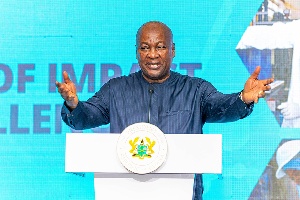- Home - News
- Elections 2024
- News Archive
- Crime & Punishment
- Politics
- Regional
- Editorial
- Health
- Ghanaians Abroad
- Tabloid
- Africa
- Religion
- Photo Archives
- Press Release
General News of Tuesday, 8 April 2025
Source: www.ghanawebbers.com
Mahama promises regional collaborations in higher education and research
President Mahama Reaffirms Commitment to Regional Collaboration in Education
President John Dramani Mahama has reaffirmed Ghana's commitment to regional collaboration. He spoke at the opening ceremony of the 10th anniversary celebration of the African Centres of Excellence (ACE@10).
The event took place from April 7 to 9, 2025. It gathered education ministers, researchers, university leaders, and development partners from across Africa. President Mahama emphasized that today's challenges cannot be solved in isolation.
He highlighted issues like public health, food security, climate resilience, and digital transformation. These challenges are complex and require collective efforts to address them effectively.
Over the past decade, the ACE program has transformed higher education in Africa. There are now over 80 centres across 20 countries. Ghana hosts impactful centres such as WACCI, WACCBIP, and WAGMC.
These centres foster research and innovation while training a new generation of scientists. For instance, WACCI improves agricultural productivity through better crop varieties and farmer training.
WACCBIP is recognized for its contributions to infectious disease diagnosis and pandemic response. Meanwhile, WAGMC focuses on genetic health issues like sickle cell disease.
President Mahama called for sustained investment in these centres. He stressed the need for stronger links between institutions and industries. “We must invest more into these centres,” he said.
He also urged for gender equity in science and technology fields. The President praised ACE’s support for women in STEM through scholarships and mentorship programs.
Mr. Ousmane Diagana from the World Bank praised ACE's vision and results. He noted that it provides a solid pathway to sustainable development.
According to Mr. Diagana, ACE has trained over 90,000 students including 7,650 PhDs. The program facilitated nearly 18,000 internships and produced over 10,350 peer-reviewed publications.
He emphasized that democracy is linked with higher education success due to strong leadership support for the program.
Mr. Diagana highlighted innovative outcomes from various countries involved in ACE initiatives—genomics in Nigeria, biotechnology in Ghana and Kenya, AI integration in Rwanda and Senegal.
“The ACE programme lays a foundation for a knowledge-driven economy,” he added. He stressed continued investment in human capital focusing on STEM fields.
Minister of Education Mr. Haruna Iddrisu expressed government support for education innovation during his address at the event.
In a light-hearted remark about rebranding ACE’s acronym he suggested calling it "Higher Education Centre for Excellence."
Mr. Iddrisu echoed calls for sustainability in higher education research on traditional medicine inspired by Uganda's successes.
He proposed establishing new centres focused on foundational learning and youth development to tackle literacy gaps and graduate unemployment issues.
“One major concern of our President is youth empowerment,” he stated while suggesting collaboration with ACE on this initiative.
He announced two significant initiatives: a national research fund with $5 million dedicated to ACE grants; funding from the Ghana Education Trust Fund will support five local PhD students at every public university this year.
Mr. Iddrisu concluded by calling for ongoing collaboration with development partners like the World Bank while emphasizing self-reliance.











